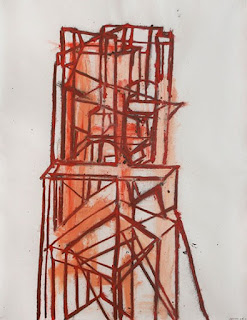Tony Bevan: Head
I finally managed to get over to the Cartwright Hall
in Bradford to see the Tony Bevan exhibition. For those of you interested in
charcoal as a drawing medium Bevan is a must see. He has been working for many
years now, pushing his charcoal drawings into a territory that verges into
painting but never quite leaving behind the fact that he is still drawing.
He often works directly onto un-stretched canvas, and
has developed a drawing technique that relies on the fact that the roughness of
the canvas causes the charcoal to spatter and break off as he pushes his
charcoal sticks across the bumpy surface. He is particularly interested in how
natural charcoal will break and shatter as internal fault lines are revealed as
the charcoal is worn away. In particular the slight weaknesses caused by
changes in the charcoal grain, for instance the notch left from where a branch
has been lopped off, make for sudden breakages. As the charcoal snaps, it both
makes more spatter markers and the hand’s pressure causes the remainder of the
charcoal stump to drop down sharply onto the surface, causing yet another mark
variation.
Tony Bevan
You can get an idea of how he works by watching this video of him talking about his work.
The Cartwright Hall is an
interesting museum to visit if you have time, especially as its very easy to
get to Bradford from Leeds by public transport. Their collection is fascinating
because it has been selected to reflect the multicultural nature of the city’s
population. In the gardens there is a very strong piece by the Pakistani
artist Imran Qureshi. He has drawn his flower inspired patterns across the
flagstones and walls, his mark-making process being a cross between spattering
and calligraphy, each set of marks playing off against different elements of
this formal garden.
Imran Qureshi
If you are interested in working outside and still
remaining sensitive to the surfaces you are working on Imran Qureshi is a good artist to
explore.
In the main collection I was particularly interested
in how the ‘Connect’ exhibition was curated. The upstairs gallery
is devoted to a mixed exhibition of art from a wide range of cultures and
times, some very interesting Asian artists in particular were being exhibited,
and often these were artists that had drawing right at the centre of their
practice. However I was particularly impressed with the huge Hughie O’Donoghue
piece ‘Three Studies of Crucifixion’ from 1996.
Hughie O’Donoghue ‘Three Studies of Crucifixion’
Detail of above
These large images are made
from sections of printed papers, using a Carborundum
printing technique. See: for a short video on the technique and click for how to print from a carborundum plate.
Working in this way you can work on small sections and
piece the larger image together. Because of the overall power of the final
image you don’t really notice it’s made out of sections. It’s worth a visit to
the Cartwright Hall collection just to see these images.
They also have a specialist collection of contemporary
printmaking. The Cartwright Hall used to host the International Print Biennale
and have built a collection of prints around purchases made during the period
that the Biennales were staged. These include terrific prints by very well regarded
artists in a wide range of print media, (Baselitz, Christo, Rauschenberg, Hockney etc etc) so if you are looking at printmaking as
an extension of drawing it’s an excellent place to go and study techniques in
more depth. If you want to go through their print collection and explore it in
detail, you should ring first and book an appointment. For enquires
regarding the print collection please contact cartwrighthall@bradford.gov.uk
Georges Baselitz
Christo
For more details as to what’s on see:
The bus to Bradford interchange
goes from Leeds City Centre, either from the main bus station or The Headrow.
It takes 46min – leaves every 10 minutes. Catch a 72, 670 or X6.
Then
from Bradford City Centre bus interchange to the Cartwright Hall it takes
9min
and buses leave every 10 minutes. If you get a day rider you could just fit
this in with a normal day’s travel. Catch a 622, 623 or 626.
For more on 'Charcoal'
For
For more on 'Charcoal'
For












No comments:
Post a Comment